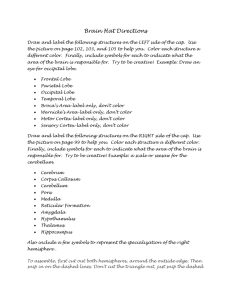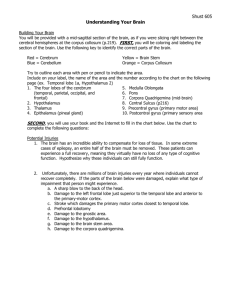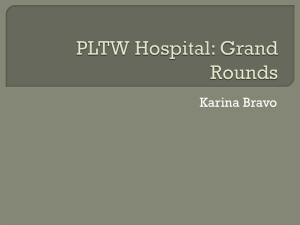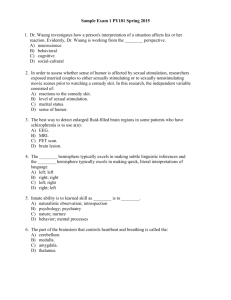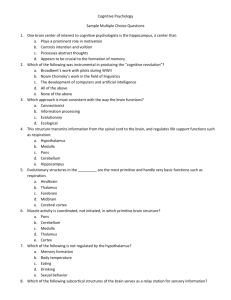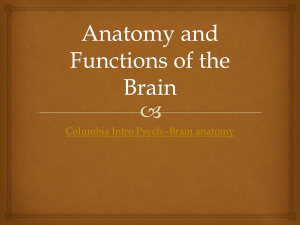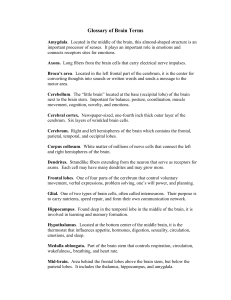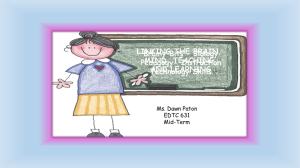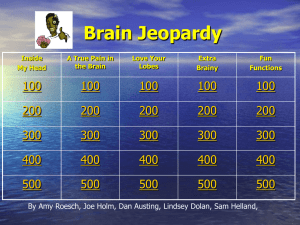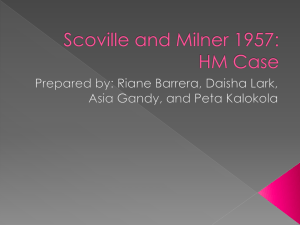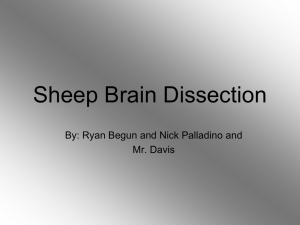chapter 3 biological bases of behavior
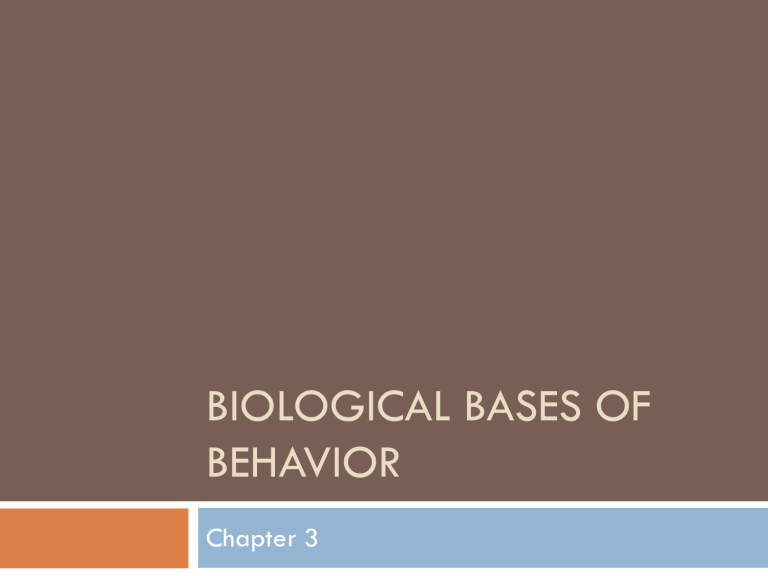
BIOLOGICAL BASES OF
BEHAVIOR
Chapter 3
1. Which part of the brain is responsible for combining sounds into words and arranging words into meaningful sentences?
(A) Broca’s area
(B) Wernicke’s area
(C) Hypothalamus
(D) Hippocampus
(E) Medulla
2. Damage to the cerebellum would most likely result in:
(A) Respiratory failure
(B) Heart failure
(C) Loss of muscular coordination
(D) Loss of hearing
(E) Loss of memory
3. The pons is located between the medulla and other brain areas. It is responsible for which of the following?
(A) Motor coordination
(B) Seeing and hearing
(C) Sleep and arousal
(D) Balance
(E) Emotional reactions
4. When humans suffer damage to this part of the brain, there can be a lapse into a permanent state of unconsciousness.
(A) Temporal lobe
(B) Parietal lobe
(C) Frontal lobe
(D) Cerebrum
(E) Reticular formation
5. Which part of the brain is affected during a split-brain operation?
(A) Cerebellum
(B) Corpus callosum
(C) Cerebrum
(D) Medulla
(E) Pons
6. The limbic system is responsible for
(A) The control of hunger, thirst, and sex
(B) Breathing regulations
(C) Balance and coordination
(D) Speech
(E) Language
7. The main job of the thalamus is:
(A) Receiving sensory information and relaying it to the appropriate area
(B) Processing sensory information about touch, pain, and temperature
(C) Regulating motivational and emotional behavior
(D) Coordinating movements and timed motor responses
(E) Controlling all auditory functions of the brain
8. Bodily sensations such as touch, pressure, and temperature are controlled in which area of the brain?
(A) Occipital lobe
(B) Temporal lobe
(C) Frontal lobe
(D) Parietal lobe
(E) Motor lobe
9. As a result of her car accident, Mimi suffered damage to her Broca’s area of the brain. What symptoms will she suffer as a result?
(A) Inability to see color
(B) Inability to speak in fl uent sentences
(C) Inability to walk
(D) Inability to remember short term
(E) Inability to remember long term
10. Knowing what you are touching or how hot to make the water for your shower involves which of these areas of the brain?
(A) Temporal lobe
(B) Motor cortex
(C) Cerebrum
(D) Frontal lobe
(E) Somatosensory cortex
11. Emma is telling her younger sister stories about her first
Christmas in their new home. Which part of the brain is Emma using to recall these memories?
(A) Hypothalamus
(B) Thalamus
(C) Amygdala
(D) Hippocampus
(E) Medulla
12. Which of the following is not controlled by the hypothalamus?
(A) Sex
(B) Eating and drinking
(C) Balance and coordination
(D) Motivation
(E) Emotion
13. A neuron without terminal buttons would be unable to
(A)
(B)
(C)
(D)
(E)
Receive information from neighboring neurons
Generate an action potential
Direct the synthesis of neurotransmitters
Secrete neurotransmitters to postsynaptic neurons
Transport ions across the cell membrane
14. Loss of the ability of the brain to produce adequate levels of dopamine often leads to
(A)
(B)
(C)
(D)
(E)
Aphasia
Alzheimer's disease
Parkinson's disease
Bipolar disorder
Amnesia
15. Which task is primarily a right cerebral hemisphere function in most people?
(A)
(B)
(C)
(D)
(E)
Understanding written language
Understanding spoken language
Processing visual info to the left eye
Recognizing faces
Processing sensory info from the right leg
Unit 3 Free Response Question Assignment
Joe was involved in a car accident that smashed in the whole left side of his head. His left ear is damaged completely, and he will probably lose vision in his left eye. His whole right side was completely untouched. He is currently in an induced coma, but doctors know that he will survive. However, they are not able to fully assess what will be affected and how Joe will function when he awakens. Speculate how each of the following aspects of the brain and nervous system could influence Joe’s recovery in the coming weeks and months. State how Joe will be affected and how he will function.
Limbic System
Temporal Lobe
Broca’s Area
Wernicke’s Area
Thalamus
Cerebellum
Answers
3.
4.
5.
1.
2.
6.
7.
8.
B
A
A
D
A
C
C
E
9.
10.
11.
12.
13.
14.
15.
D
C
D
B
E
C
C
